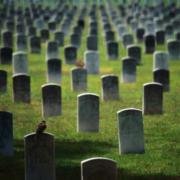After the deaths, holiness
This week we’re reading Acharei Mot-Kedoshim. Acharei mot means after the deaths. After the deaths of Aaron’s two sons, we read, vayidom Aharon: and Aaron was silent. That’s resonating with me in a new way this year.
After the deaths that covid-19 has wrought in our county, our nation, our world — after reading the accounts of ICU nurses and ER doctors in New York — after facing the inconceivable suffering in this moment — I understand Aaron’s silence anew.
Sometimes there are no words. Sometimes nothing we can say makes anything better, and our words of hope for the future ring hollow or feel like bypassing. All we can do is sit with our grief, or sit with our fellow human beings in their grief.
Our double Torah portion this week takes its name from the two parshiyot that make it up, Acharei Mot and Kedoshim. Acharei mot: after the death. Kedoshim: God tells Moses to tell us, Kedoshim tihiyu: y’all shall be holy, for I your God am holy.
This year, the name of the double portion reads to me like a sentence, or maybe like a promise. Acharei mot, kedoshim. After the deaths, y’all can be holy. Because deaths are always part of reality, and we have a choice in how we respond to them.
When it comes to the horrors of covid-19, we can respond with nihilism: deciding that suffering is inevitable, so we might as well do whatever we want. People are going to die no matter what, so it’s every person for themselves, right?
Or we can respond with care and compassion: taking care of our fellow human beings in the ways we are able. I think you can guess which one of those two options I think is ethical and correct. But don’t take my word for it. Take the Torah’s word.
Our Torah portion gives us specifics: Care for our elders. Keep Shabbat. When we harvest the earth’s abundance, leave some for the poor. Care for the widow, the orphan, and the stranger in our midst. Don’t keep a laborer’s wages until morning.
Here’s another way to put that:
Preserve the life and safety of our elders, and make their needs a priority. Give them the resources they need to stay healthy. Wear masks and shelter in place to protect their immune systems from being ravaged by covid19.
Remember that human lives are more important than productivity. That means life matters more than the economy. If someone doesn’t have enough to live on in this pandemic moment, we can help them. If someone has died, we can’t bring them back.
Make sure everyone has enough to eat: that means give to our local food pantries, if we can, and it also means ensure the safety of those who work in the fields and the meat packing plants. Don’t force them to work in unsanitary and unsafe conditions.
Care for all who are vulnerable to abuse. Torah speaks often in the language of “the widow, the orphan, and the stranger who lives among you.” Today that might be immigrants, refugees, people of color, queer and trans people. Those most at-risk.
Don’t exploit those who labor for others. Protect and uplift them and give them the resources they need to be safe and healthy and fed. In a nutshell, protect and uplift life. That’s what it means for the members of a community to be kedoshim.
Kedoshim is a plural word. As a community, it’s our job to respond to death with compassion. As a community, it’s our job to respond to death by taking care of the vulnerable. As a community, it’s our job to live out Jewish values — to be holy.
Acharei mot: kedoshim. After these deaths, in response to these deaths, in response to the world’s suffering today, it’s our calling to be a holy community. To respond by caring for those in need and making choices that uplift life.
Kein yehi ratzon — may it be so.
This is the d’varling that Rabbi Rachel shared at Shabbat morning services via Zoom this week. (Cross-posted to Velveteen Rabbi.)





